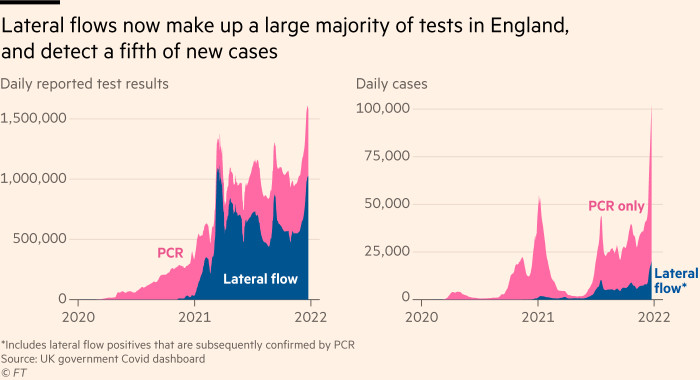UK health secretary Sajid Javid has admitted the government will “need to constrain” the supply of rapid Covid-19 tests over the next fortnight to respond to “unprecedented demand” driven by the Omicron variant surge.
“The arrival of the Omicron variant has caused record case numbers and unprecedented demand for both PCR and Lateral Flow Device [LFD] tests,” Javid wrote in a letter to MPs on Wednesday evening. “This has inevitably placed strain on the testing system, despite the impressive scaling-up of supply, logistics and laboratory capacity.
“We expect to need to constrain the system at certain points over the next two weeks to manage supply over the course of each day, with new tranches of supply released regularly throughout each day.”
The letter follows several weeks in which the government booking platforms for PCR tests, which require laboratory processing but are more accurate, and rapid LFD tests have been blighted by patchy availability.
Is the supply of lateral flow tests keeping pace with demand?
The rapid spread of the Omicron variant has heaped more pressure on the testing system than any previous Covid wave.
This is in large part because, in England, double-vaccinated close contacts of a Covid case can eschew self-isolation by taking daily lateral flow tests for a week, while infected people who are vaccinated can leave isolation after taking an LFD on days six and seven.
“We can’t have enough tests right now,” said Irene Petersen, professor of epidemiology and health informatics at University College London.
Javid pledged in his letter to MPs to triple supply from 100m LFDs per month before Omicron.

According to the latest figures cited by Boris Johnson, prime minister, 200m tests will be sent directly to UK households over the next month, alongside 42m being supplied through pharmacies. This equates to just over one seven-test pack per household.
But Petersen said the government had been “very vague” about how LFDs were being prioritised, adding that this had created “panic” over the lack of availability on the ordering platform.
“We need to do smart testing by ensuring supplies get through to key workers looking to avoid or end their self-isolation period,” she said, echoing calls by doctors and nurses’ representatives. “Only after that can we think about getting tests out to as many households as possible.”
Prof Azeem Majeed, head of the department of primary care and public health at Imperial College London, said some of his patients were “testing their whole family everyday” because of “the lack of clear guidance”.
Is there a global shortage of lateral flow tests?
On Wednesday, Tory MP Sir Roger Gale tweeted that the health secretary had informed him that the “lateral flow and PCR test gridlock” in his Kent constituency was the result of a “world shortage”.
Two people familiar with the government procurement process told the FT that the UK was facing “much fiercer competition” for lateral flow supplies compared with earlier in the pandemic because more countries were now deploying the technology.
They also said the UK’s small pool of approved suppliers limited its options. Only four biotech companies have exceptional use authorisation to supply rapid test kits for self-use through the NHS Test and Trace programme.
“No domestic suppliers can scale up so the government has to rely on the best of breed international manufacturers who are out there . . . largely from China,” said the source.
“These companies are getting demands from France, Germany, Poland, Spain, Italy . . . All over the world lateral flow tests are seen as the answer to Omicron,” they added.
How stretched is PCR testing capacity?
In a meeting on December 20, the government’s Scientific Advisory Group for Emergencies warned that “capacity limits [for testing] may already be affecting case data”.
The burden on the PCR testing service has led some experts to call for a change in government strategy.
Majeed said health authorities in England should stop asking people to take a PCR test to confirm a positive LFD result to relieve pressure on the “already creaking” system.
Between January and March this year, England’s public health body suspended confirmatory PCR tests because of high prevalence. A similar move was made by Danish health authorities earlier this month.
Professor Alan McNally, a microbiologist at the University of Birmingham, called in a series of tweets on Thursday for the health secretary “to move to community symptomatic LFD testing” in England instead of using more time-intensive PCR tests.
“You cannot possibly run a community PCR testing program with quarter of a million cases per day,” he said.
But a person close to England’s testing programme said that lab capacity was “only part of the chain” and supplies of PCR testing kits and reagents could also “come under strain as test volumes increase”.
“We are not the only ones doing this and all nations — in both private and public sectors — are pulling on the same inventories of everything from plastic tips and tubes to swabs and PCR reagents,” said the source.
How will lateral flow tests affect transmission on New Year’s Eve?
Iain Buchan, professor of public health at Liverpool university, said LFDs “broke transmission chains” over Christmas by resulting in people “staying home when positive rather than going to see granny”.
He predicted the same benefits would come from testing over New Year’s Eve, if sufficient supplies were available. “Societal behaviour around risk mitigation and testing has completely changed,” he said.
But Petersen said she expected LFD usage may have been higher over Christmas because of younger groups “feeling a greater sense of responsibility towards older people in their families”.
“Lateral flow tests work when you have everybody doing them,” she said. “If you go to a big party, where only 50 per cent of people have done it, it will reduce spread but it’s less of a guarantee.”
However, John Drury, professor of social psychology at the University of Sussex, said he worried about the “over reassurance” offered by a negative result.
“How many people know that [LFDs] need to be taken as late as possible otherwise they are a lot less effective?,” asked Drury. “They can help people make an informed judgment of how to interact with others but they can provide false reassurance.”


